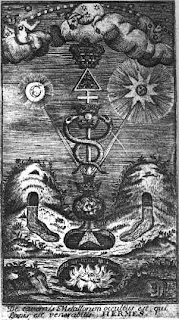 “As above, so below" -- a "great word,” a sacramental phrase, a saying of wisdom, an aphorism, a mystic formula, a fundamental law - or a two-edged sword of word-fence, that will probably do the wielder serious damage if he is not previously put through careful training in its handling?
“As above, so below" -- a "great word,” a sacramental phrase, a saying of wisdom, an aphorism, a mystic formula, a fundamental law - or a two-edged sword of word-fence, that will probably do the wielder serious damage if he is not previously put through careful training in its handling?
Whether this famous “word” is of Hermetic origin or no, we will not stay formally to enquire. In essence it is probably as old as human thought itself. And as probably, the idea lying underneath it has been turned topsy-turvy more frequently than any other of the immortal company.
“As above, so below” doubtless enshrines some vast idea of analogical law, some basis of true reason, which would sum up the manifold appearances of things into one single verity; but the understanding of the nature of this mystery of manifoldness from the one - all one and one in all—is not to be attained by careless thinking, or by some lucky guess, or by the pastime of artificial correspondencing. Indeed, if the truth must out, in ninety-nine cases of a hundred, when one uses this phrase to clinch an argument, we find that we have begged the question from the start, ended where we began, and asserted the opposite of our logion. Instead of illumining, not only the subject we have in hand, but all subjects, by a grasp of the eternal verity concealed within our saying, we have reversed it into the ephemeral and false proposition: “As below, so above,” Deus, verily, inversus est demon; and there's the devil to pay. But fortunately there is some compensation even in this in an illogical age; for, as all the mystic world knows, Demon is nothing else but deus inversus.
Yes, even along our most modern lines of thought, even in propositions and principles that are, with every day, coming more and more into favour in the domain of practical philosophizing, we find our ageless aphorism stood upon its head with scantiest ceremony.
In the newest theology, in the latest philosophy, we find a strong tendency to revive the ancient idea that man is the measure of the universe - whether we call this concept pragmatism or by any other name that sounds “as sweet”. “As below,” then, “so above.” In fact we do not seem to be able to get away from this inversion. We like it thus turned upside down; and I am not altogether sure that, even for the keenest-minded of us, it is not an excellent exercise thus to anthropomorphize [In the sense of Anthropos of course, and not of his carcase.] the universe, and to fling the shadow of his best within on to the infinite screen of the appearance of the things without. For is not man kin really with all these - worlds, systems, elements, and spaces, infinitudes, and times and timelessness? (More ...)